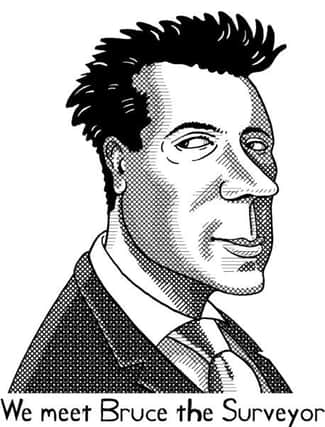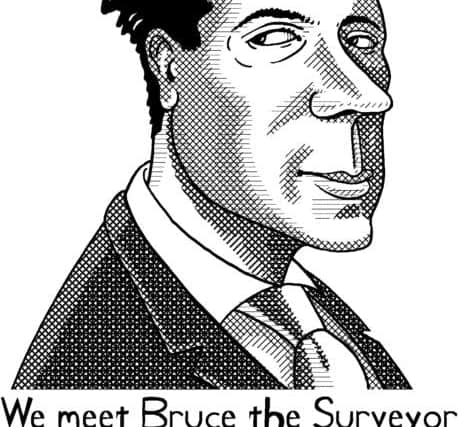44 Scotland Street: A proposition for Pat


Her irritation at being addressed by the childish soubriquet was intense, but did not last for more than a few seconds. One had to forgive Bruce – it was impossible to be angry with somebody like him, with his clove-scented hair gel, his narcissism, his incorrigibility, his breezy self-confidence, his propensity to infantilise the names of others …
He bent forward and kissed her on the cheek. There was a strong scent of cloves.
Advertisement
Hide AdAdvertisement
Hide Ad“I know I’m late,” he said, as he sat down opposite her at the table. “But I knew you’d wait.”


Pat frowned. How did Bruce know that she would wait? Was she the sort of person who could be expected to wait because she had nothing better to do – or, because even if she would not normally wait, she would always wait for Bruce? To paraphrase Charles de Gaulle, who said – to those who urged him to take action against the inflammatory rhetoric of Jean-Paul Sartre – that one did not imprison Voltaire; one does not stand up Bruce, no matter how late he may be. But she simply could not let him imagine that she had nothing better to do than sit in the Elephant House and wait for him.
“I was about to go,” she said. She wanted to sound firm, but the words came out almost apologetically.
“Where?” he asked casually. “Are you working today?”
Pat helped Matthew in his gallery in Dundas Street, but only on three days a week.


“No.” Again it was not the answer she had intended, but Pat was truthful and whatever the stakes for her self-esteem, she could not tell a bare-faced lie.
“Then that’s all right,” said Bruce.
It is not all right, she thought. It is not. But she said instead, “It’s good to see you.”
Bruce inclined his head, as if to acknowledge an act of homage. Of course it was good to see him; he had been good to see for as long as he could remember. Even as a small boy, he had attracted admiration for his looks; the cherub had become an angel, had become a youth from a Giotto painting, had become a matinée idol …
“So,” he said. “How’s Patsy?”
Advertisement
Hide AdAdvertisement
Hide AdThis was a complex offence. Bruce had an irritating habit of referring to people – in their presence – in the third person. That was count one. Then there was the diminution of Pat’s name. That was count two. And finally there was the question of a possible play on the word patsy, as used in the argot of fraud. The patsy was the victim; was that what Bruce was implying? She decided it was not; if Bruce employed word play, it was not that sophisticated.
“I’m all right,” she said.
He reached across the table and patted her hand gently. “Good,” he said. “And you were about to ask how I was, weren’t you?”
“Was I?”
He winked. “I think you were. Well, there’s nothing wrong with me. Rien. But I could do with a cup of coffee.” He paused. “Are you going to go and get something for yourself?”
Pat seethed. “What do you want?” she asked. This was intended to be a question about the point of their meeting: Bruce clearly wanted something.
“Thanks,” said Bruce. “I need to make a phone call. I’ll do that while you’re fetching. Hope you don’t mind. I’ll have a latte – semi-skimmed, if poss. I’ll keep the table.”
Pat caught her breath. She wanted to storm out; she wanted to tell this outrageous man that his charms would no longer work on her; that she saw through everything; through the hair gel, through the banter, through every arrogant assumption about female psychology; through the whole, outrageous act – she saw right through it. But instead she asked him whether he took sugar.
“Nyet,” Bruce replied. “No sugar, thanks.” Then he added. “I thought you’d remember that – you know, from the old days.”
Advertisement
Hide AdAdvertisement
Hide AdAs she stood at the counter waiting to be served, Pat reflected on what Bruce had just said. It was typical of his solipsism that he should imagine that she would remember every little detail of his preferences. Who would possibly remember, after some years, whether or not somebody else took sugar? If the other person was immensely important, of course, one might remember a little detail like that – if one went to tea with the Pope, for example, one might say, years after the event, He doesn’t take sugar in his coffee, you know. Or he might make some small remark about something very insignificant, and one would remember that, with all the clarity with which important events can be incised into memory. Such as, The Pope said that his watch wasn’t keeping very good time. Something like that. To which, of course, the reply might be that the watch of such a personage is calibrated in centuries rather than minutes and hours …
She waited her turn. Two young Japanese women were ahead of her, talking to one another in hushed tones. One of them glanced at Pat and smiled; it was a tiny feeler of empathy, and she felt it touch her briefly, a flicker of warmth. They were strangers to her, far, she thought, from everything that was familiar to them, visiting this café for its literary associations. They were pilgrims, in a sense, not all that different in their quest from those who went to a religious shrine, to a grotto where some manifestation was said to have occurred a long time ago, or to a river bank where the water was in some way holy and capable of washing away all the pains and cares and grubbiness of our ordinary lives.
She took the tray with two coffees back to the table. Bruce had finished his call, and was tucking his phone back into his pocket.
His tone, when he spoke, was business-like. “Right,” he said. “You’ll be wondering why I wanted to see you. Here’s the inf. I’m going to be setting myself up in business.” He smiled at her and told her what he had planned. Then came the proposition. “And I want you, Pat, to work with me. How about it?’
She stared at him. “Are you serious?” she asked. “I mean, as in serious?”
Volume 12, Chapter Three